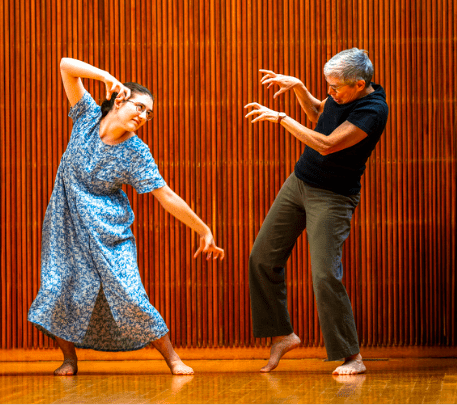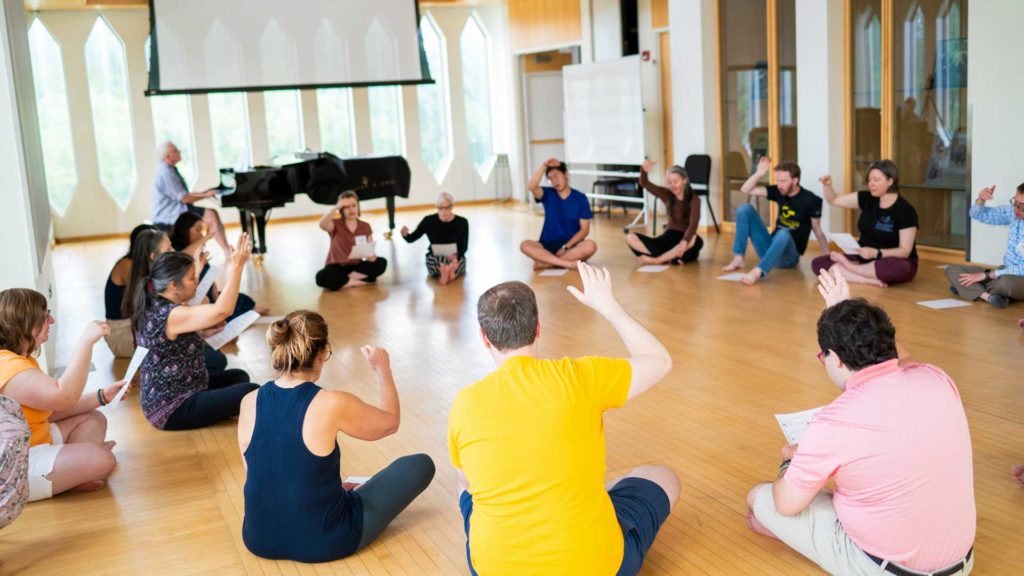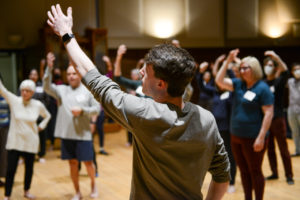
Are You Familiar with the T2 Program?
Have you ever heard of the T2 Program? If not, this article will familiarize you with an outline of this important document which is shaping the future of Dalcroze teacher training in the United States.
The T2 program, which symbolizes the two Ts in Teacher Training (and is sometimes pronounced as T-squared and other times as T-two) represents over 100 years of Dalcroze tradition and instruction that has never before been written down in such detail. This training program represents a consensus of diverse perspectives and unity within our community of Dalcroze educators and artists. To say that this document has been a long time in coming is an understatement. Several thousand hours have gone into the creation of this document; I believe it is a step forward for all of us.

Why does the T2 Manual Exist?
At the national conference in 2012, held in Fort Collins, Colorado, the DSA membership asked for and then voted on several resolutions for the Professional Development Committee to consider, including to:
- Develop guidelines and criteria for Dalcroze accreditation standards and renewal.
- Develop guidelines and criteria for earning the Dalcroze Professional Certificate and Dalcroze License.
- Develop a variety of training opportunities in which prospective teachers can meet the standards of the Dalcroze Professional Certificate and License.
As a result, the DSA’s Board of Trustees appointed a committee open to all diplômé holders and licentiates who have been involved in teacher training for a minimum of three years, to develop guidelines and criteria for accrediting existing training programs and conducting ongoing review and renewal of training program accreditation.
After ten-plus years of hours-long meetings, first over conference calls, then skype, and finally now on zoom, the PDC was pleased to present to the DSA community both here and abroad the resulting T2 Manual for Dalcroze Teacher-Training. The committee expects that this document will need much revision and adjustment in the coming years. Further, it may take time for existing training centers to make the necessary adjustments to achieve accreditation and enable full participation in document as outlined. The PDC asks the membership for its continued patience as work through this process.

Diplômés and the diplôme
Professional Studies in Dalcroze Education is unique in that the authority to offer Dalcroze credentials
lies with individuals who have earned the diplôme supérieur (literally, highest diploma) from l’Institut
Jaques-Dalcroze in Geneva, Switzerland. Institutions alone cannot grant Dalcroze credentials. Those who have earned the diplôme supérieur are referred to as ‘diplômés,’ (with an ‘ey’ sound at the end of the word) not ‘diplômes’ (with an ‘ohm’ sound at the end of the word) as the former applies to the person and the latter applies to the credential.
Diplômés must oversee all training that is completed under their auspices. In this way, l’Institut Jaques-Dalcroze protects the name “Jaques-Dalcroze” and aims to maintain a high quality of teacher training among the community of diplômés worldwide.

Licentiates can also offer teacher training
Licentiates (those who have earned the Dalcroze license) are valued members of the teacher-training community at l’Institut Jaques-Dalcroze and throughout the world. In many schools, they work in tandem with diplômés and are directly involved in training new generations of teachers.
Because the United States is so large, we have many areas of the country that are without Dalcroze
teacher-training opportunities. The PDC has set out to create possibilities for those qualified and approved licentiates to offer teacher-training on behalf of the PDC and the DSA for Level 1 and/or Level 2 of the teacher training guidelines outlined in this manual.
The PDC, comprised of both diplômés and licentiates, has organized the structure and content of the
program so that a diplômé does not need to be physically present the entire time to facilitate the introductory aspects of the training. Approved licentiates of the T2 program may teach up to 80% of the
Level 1 training program course, assuming that they follow the T2 curriculum guidelines. A diplômé must teach for at least 20% of the program and take part in the examination procedures. L’Institut Jaques-Dalcroze has offered their support of this requirement, if a program is unable to secure a diplômé. If graduates from Level 2 wish to continue their studies and become a certified Dalcroze teacher, they would complete their training at an accredited institution under the direct supervision of a diplômé.
Licentiates wishing to participate in teacher training through the Professional Development Committee T2 program first must be approved by the PDC. Schools and programs run by PDC-approved licentiates
can take part in this special PDC opportunity to offer teacher training in Levels 1 and/or 2. In situations where more than one licentiate teach together, at least one licentiate must be PDC-approved to implement the T2 program. Licentiates may teach up to 80% of a given level, the remaining 20% must be taught by a T2 diplômé.
A successful application to this program includes
- A résumé documenting at least the following:
a. Three years of Dalcroze teaching experience at the license level (they must have had the
license for at least 3 years).
b. Two summers or equivalent of teaching experience mentoring with a diplômé at a T2-accredited program at each level they wish to offer (at least two weeks for each summer or equivalent). - A Cover Letter including:
a. The candidate’s motivations for participation and proposed contribution to the program.
b. A description of how the licentiate plans to implement the program. - A letter of endorsement from two diplômés.
- Videos demonstrating the candidate’s teaching of adults in eurhythmics, solfège, improvisation,
and pedagogy (approximately 30 minutes for each branch).
Once a licentiate has PDC approval, then their program must obtain DSA accreditation. The DSA
accreditation application may be submitted at the same time as the PDC approval application.
Submit all materials to the Professional Development Committee Chair, Michael Joviala
(michael@dalcrozeusa.org). The entire PDC will review all applications. Please allow at least 60 days for
review.

Guidelines for a training center to offer the T2 program
In order for the T2 program to function in accordance to guidelines set forth by l’Institut Jaques-Dalcroze
and the DSA, all DSA-accredited institutions that are participating in the T2 Program must adhere to the
following:
- The PDC should ideally be comprised of a majority of Diplômés who directly oversee the ongoing development and organization of the Professional Development Committee and subsequent programs.
- The PDC reserves the right to make changes at its own discretion based on feedback from students and faculty. It is expected that this manual will be revised often to ensure that the program is running smoothly. In the cases where a student is in the middle of the program when changes are enacted, it is the responsibility of the individual faculty to inform his or her students of changes in the program as they arise. In these cases, the student may opt to adapt to the new version of the T2 Manual or stay with the previous version. This must be worked out in writing between the individual program and the student.
- Teachers wishing to take part in the T2 program must receive DSA accreditation.
- Those licentiates who wish to offer teacher training within the T2 program must be approved by
the PDC. - Those who achieve the Introductory Credential in Dalcroze Education (all of Level 1) and/or the
Applied Credential in Dalcroze Education (all of Level 2) are welcome and encouraged to use
Dalcroze principles in their own teaching, but they are not authorized to offer Dalcroze courses or
use the name Jaques-Dalcroze in their course titles. - Only those who complete level 3, The Professional Certificate in Dalcroze Education, may call themselves Dalcroze teachers and offer Dalcroze coursework.
- Feedback regarding the ongoing success or shortcomings of the program should be directed to
DSA Professional Committee Chair, Michael Joviala (michael@dalcrozeusa.org)
What are the benefits of the T2 program?
As a student new to Dalcroze teacher-training, you will encounter the culmination of centuries of work, especially in chapters 1, 2, and 3 of the T2 manual. Our country has the most diplômés (outside of Switzerland); there is a deep, strong tradition of Dalcroze practice in this country. This manual thus represents the teaching of several people and communities, not just one person.
Our work has historically relied on vague, nebulous curricula, the purpose of which was to allows for teacher flexibility: teach the students in front of you; work on their specific needs. This type of training can be likened to an apprenticeship model. While this may work for some programs and some teachers, at the same time, this type of teaching lacks clarity.
Longevity and relevance of any type of work requires clarity, enough so that people from outside the Dalcroze community can recognize our musical goals. While the T2 document is for Dalcroze insiders, everyone competent musician knows the fundamental music concepts that are required within (e.g., compound vs. simple meter; syncopations; key signatures). What is historic is that now these goals and skills have been written down in plain prose accompanied by musical examples and eurhythmic exercises.
Students who are interested in Dalcroze teacher-training need to know what they are getting into, as this work requires an abundance of time, travel, and solo practice. Students who attend training centers offering the T2 program can expect to receive clear guidelines on the skills they need to master in order to earn the Dalcroze Professional Certificate. The curriculum clearly states the goals for each particular skill and the T2 manual lists several musical examples pertaining to each requirement. Theoretically, students could begin their training in at one school, and complete at another, as the T2 accredited programs all agree on the requirements to become a Dalcroze teacher.
The T2 program comes with standardized examination forms, which are given to students before they even begin to think of completing a level of coursework. Knowing the expectations and the degree of mastery required allows students to know how to focus their practice.
T2 = Transparency
Transparency in our training programs sets our community up to be successful; it helps our students and faculty to make informed decisions. Faculty and directors of T2 programs benefit by regularly reviewing each other’s work. Having levels of skills and requirements allow teacher-trainers to have productive conversations about the standards we are trying to uphold for each level of the teacher-training process.
Other music education systems (e.g. Suzuki, Orff, Kodály, etc.) are highly organized and systematically laid out, allowing for their communities to share teaching ideas, easily recruit new teachers, and provide teacher resources. This is the direction that the Dalcroze community hopes to take in the years to come.
NB: Other non-T2 accredited institutions can and should publish their own curricula, goals, skills, and levels for Dalcroze teacher-training. By creating and participating in the T2 program, we are not discounting the work of non-T2 programs.
In a following blog post, I’ll list the details of the curriculum requirements for levels 1, 2, and 3 of the T2 program. The entire T2 document is currently online if you would like to peruse further.
The DSA thanks the many Dalcroze educators who have changed lives through their work. Please, tell us about the educators who have inspired you or consider a donation to the DSA to support their legacy.